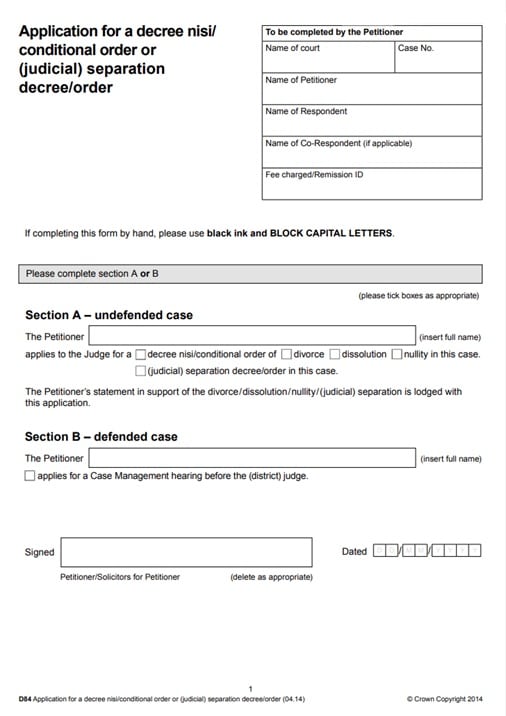Obtaining a decree nisi is a critical stage in getting a divorce. You must obtain a decree nisi before you can obtain a decree absolute (final order that confirms the end of the marriage). But what is a decree nisi and how do you make an application? In this article, our divorce solicitors outline everything you need to know.
No-fault divorce UK update
The Government made changes on 6th April 2022, allowing married couples to get a no-fault divorce. In the process of a divorce a decree nisi is now referred to as a conditional order.
If you want to contact our firm to help you with the divorce process, please visit our divorce page or call us on 0203 007 5500.
Decree nisi meaning.
A decree nisi is the first decree of a divorce. The pronouncement of decree nisi doesn’t mean that you’re divorced, as you will remain legally married until the pronouncement of the decree absolute.
The court will issue a decree nisi as long as you’ve met all of the following divorce legal requirements:
- Your marriage has lasted at least one year.
- The marriage is recognised in the UK
- Your marriage has irretrievably broken down
- The UK is your permanent home
How do I prove that my marriage has broken down?
To prove to the court that your marriage has broken down, you will need to establish one of the five grounds for divorce. The five grounds to divorce are:
- Adultery. This ground for divorce is where the respondent had sexual intercourse with someone of the opposite sex.
- Unreasonable behaviour. This ground for divorce is where the court can’t expect the petitioner to live with the respondent. Examples of unreasonable behaviour include domestic violence, social isolation, unreasonable sexual demands, among others.
- Desertion. This ground for divorce is where the respondent has deserted the petitioner for a continuous period of at least two years.
- Two years separation with consent. This ground for divorce is where the parties have been separated for at least two years. The divorce can only be granted using this ground if the respondent consents to the divorce.
- Five years separation without consent. This ground for divorce is where the parties have been separated for five years. However, under this ground, a divorce can be granted without the respondent’s approval.
How do I apply for a decree nisi?
To make an application for a decree nisi, you’ll need to complete a D84 form. Additionally, you must fill in a statement confirming that what you said in your divorce petition is true. The statement form you need to complete depends on the reason you’ve given for your divorce in the divorce petition. The statement forms are as follows:
- Adultery statement form
- Unreasonable behaviour statement form
- Desertion statement form
- 2 years’ separation with consent statement form
- 5 years’ separation without consent statement form
It’s important to note that you must also attach a copy of your spouse’s response to the divorce petition when you make an application.
What does a decree nisi look like?
The GOV.UK website has a downloadable D84 application form for a decree nisi. This form is shown below:

How long does a decree nisi take?
If the respondent doesn’t object, the petitioner can apply to the court for the ‘Decree Nisi’. There is no need for the parties to attend a hearing. If all is in order, the judge reviews the application and pronounces the decree nisi by reading it out in court. As a guide, the pronouncement of a decree nisi is typically within 6 – 8 weeks of issuing the Petition.
What if the court rejects my decree nisi application?
Suppose the court rejects your decree nisi application. In that case, they will issue you with a D79 form (notice of refusal of district judge’s certificate).
This D79 form will inform you why the application was rejected and provide guidance on any steps required to get the application granted. For example, the courts may state that they need further information.
What is the next step?
Following the pronouncement of the decree nisi, you must wait a minimum of six weeks and one day (43 days) until you can make an application for a decree absolute.
After getting a decree nisi, you will still be married.










Leave a comment Your email address will not be published.